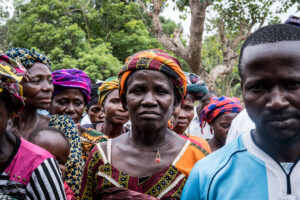
Many nations are facing a dangerous, wide-spread infectious virus for the first time in recent memory and are scrambling to learn and respond from day to day. I recently talked with my colleague and CFP’s long-term organizational partner in Sierra Leone, John Caulker, Executive Director of Fambul Tok about lessons learned in Sierra Leone from the Ebola virus disease outbreak that took place in his country between 2014-2016 with 14,000 likely cases and about 4,000 deaths. Their hard-won experience provides insight into possibilities for addressing Covid-19. Although the Ebola virus was different than Covid-19 (it was more deadly but more difficult to spread), there are lessons that could apply to the current pandemic. John shared his insights about the role of the government, the potential role of local leaders and the roles organizations can play. He also shared how the lessons from Ebola are serving Sierra Leone right now as they face Covid-19. Finally, he shared his faith that we will get through it that I found personally inspiring and reassuring.
I’ve summarized the key lessons John and his staff offered below:
The impact of a partisan landscape
When the Ebola virus hit, Sierra Leone, like so many countries, had a highly divided political landscape. Ebola started in Kailahun, the district that was a political opposition stronghold with most people supportive of the party opposing the party in power. This led to rampant rumors and resistance to any messages from the government. Conspiracy theories, including that the government was trying to kill off the population in the opposition strongholds to increase their chances of being re-elected, were spread and believed. This lack of trust made it difficult to communicate and for people to believe messages about known ways to prevent the spread of the virus. In many communities, people threw away government issued soap, believing that it was sent to do further harm. The rumors, conspiracy theories and blame game did nothing to help stop the spread of the virus and instead they hurried it along.
Trusted voices matter
Organizations that had not built strong and trusting relationships with communities, negatively impacted the fight against the virus, and in early days of the outbreak, government funding and international aid coming into the country went to organizations that couldn’t carry out the work effectively because community members did not trust them. What started to turn the tide in Sierra Leone was when people who were trusted by the communities shared consistent messages based on the most current medical understandings of prevention. In many cases, the trusted voices were local leaders, religious leaders, or members of people’s own political parties. In places where organizations had built strong connections and relationships of trust with communities, they were effective in mobilizing local leaders and sharing accurate information and practices. They could also act as liaisons with regional and national coordinators and provide information to the health care workers and national agencies that were working on testing, tracking and doing burials (Ebola victims are most contagious right after they die, so to prevent the spread, burial teams were employed to collect and bury bodies).
The role of local leadership
Compliance with the basic prevention measures was very difficult to achieve until local leaders began to create by-laws with and for their communities and took responsibility for enforcing them strictly, ex plaining their purpose and everyone’s role in stopping the spread. The by-laws outlined movement restrictions, reporting requirements and other necessary rules to stop the spread of the virus. Fambul Tok had worked extensively with community leaders and the Peace Mothers, local organized groups of women, who were readily mobilized to educate, make soap and support compliance. They were effective because they were seen as leaders in their communities and trusted by their communities.
plaining their purpose and everyone’s role in stopping the spread. The by-laws outlined movement restrictions, reporting requirements and other necessary rules to stop the spread of the virus. Fambul Tok had worked extensively with community leaders and the Peace Mothers, local organized groups of women, who were readily mobilized to educate, make soap and support compliance. They were effective because they were seen as leaders in their communities and trusted by their communities.
A trusted voice in partnership with medical community
Strong partnerships between those trusted by local communities and those leading prevention and treatment efforts were critical. Without community buy-in, accurate knowledge about prevention, testing and treating Ebola was severely compromised; without accurate knowledge, messages from local leaders were also severely compromised. Attention and energy needed to go both to identifying and empowering trusted local voices AND to communicating accurately about prevention protocols and effective treatment.
“A human face to the virus.”
The impact of living in fear, caring for the sick and losing loved ones took a huge toll on people during Ebola. Problematically, the procedures for preventing the spread and treatment also took a huge toll, especially as they ran counter to local cultural and religious practices. Fambul Tok, along with other trusted NGOs played a critical role in listening to community members about how they were being impacted. Community members were especially disturbed by the practice of having their loved ones taken by ambulance to far away hospitals. They felt like they would never see their loved ones again. This fear and distrust were heightened if people questioned whether their loved one actually had Ebola (early Ebola symptoms matched common flu symptoms). In this context of fear and distrust, instead  of reporting symptoms, people sometimes chose to risk keeping family members at home, which led to increased infections. Also, families were not comfortable with burial teams only composed of men dressing and burying their mothers, wives and sisters. Culturally, being with family and having a respectful burial that involved someone the same sex as the deceased preparing the body were important. Although the situation did require drastic measures and burials could not happen in line with normal custom, communication with government agencies by organizations trusted by communities that had listened to how they were being impacted did create change. Treatment facilities were set up in more places in the country and the government started to deploy burial teams with women. These factors helped people comply with measures that ultimately stopped the spread.
of reporting symptoms, people sometimes chose to risk keeping family members at home, which led to increased infections. Also, families were not comfortable with burial teams only composed of men dressing and burying their mothers, wives and sisters. Culturally, being with family and having a respectful burial that involved someone the same sex as the deceased preparing the body were important. Although the situation did require drastic measures and burials could not happen in line with normal custom, communication with government agencies by organizations trusted by communities that had listened to how they were being impacted did create change. Treatment facilities were set up in more places in the country and the government started to deploy burial teams with women. These factors helped people comply with measures that ultimately stopped the spread.
Pervasive testing, monitoring and tracking
The ability to test and track were critical. Widespread testing allowed not only the option of early treatment, identifying people with the virus early on before it spread, but it changed the way people had to social distance. Rather than a lockdown on a house-to-house basis, lines were drawn around communities and people who were symptomatic could not come into the communities. This meant that neighbors could interact with each other and work together. This also meant that everyone in the community was aware of each other’s health. If someone started getting sick, there was community participation in reporting the case and making sure that person got treatment and did not infect others in the community. Checkpoints along major roads and in the airport, with required handwashing and temperature monitoring, kept the virus from spreading between countries and communities.
A time to fix the cracks and build strength and cohesion
The Ebola virus exposed many problems in the national healthcare systems as well as the local and national governance structures. The unresolved conflicts and problems with coordination and communication between local and national government, international and national organizations became even more obvious and visible during the Ebola crisis. Due to the visibility of these “cracks” in the system, FT and CFP had an opportunity to create space for those at all levels of the system – community members to international organizations- to come together and facilitate honest conversations about how to start fixing the cracks, first to work towards eliminating Ebola cases and then to address governance issues and build on the strength of local leadership that developed during the outbreak. This work continued after the Ebola cases reached zero and led to a national policy designed to center communities and connect community leadership with local and national governance called the Wan Fambul National Framework for Inclusive Governance and Local Development.
Covid 19 in Sierra Leone
With the experience of Ebola, among other factors, Sierra Leone was able to remain without a positive case of Covid-19 reported until March 31, longer than most countries in the world. As early as January, there was monitoring at the airport, taking temperatures and gathering tracking information for all passengers coming from other countries. This early vigilance was due to the hard won experience developed during Ebola. Also, now that there are cases of Covid-19 in the country, citizens of Sierra Leone are listening and responding to the prevention measures established by the medical community.
There’s hope
At the end of our conversation, John shared his hope that we all would get through this pandemic. Reflecting on living for two years with the Ebola virus, he talked about dark moments when it felt like it would never end and when the anxiety, restrictions, and limited human contact became too much. In those moments, he said, it was important and really helpful to reach out to trusted co-workers and others who understand what you’re going through. Also, knowing you have support for those inevitable moments of breakdown helped to normalize them. They will come and go. He also has the lived experience of getting through to the other side; it’s possible. That confidence comes from experience. Most of us won’t have that experience until we are on the other side but we can draw strength from John and others who have gone before.

